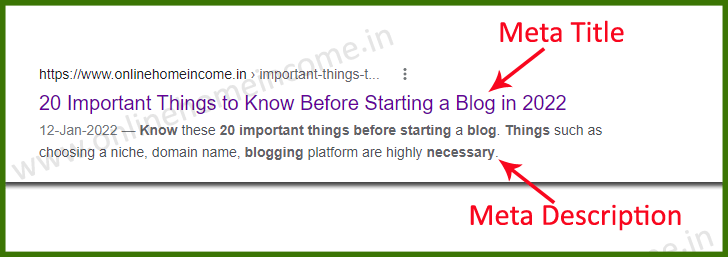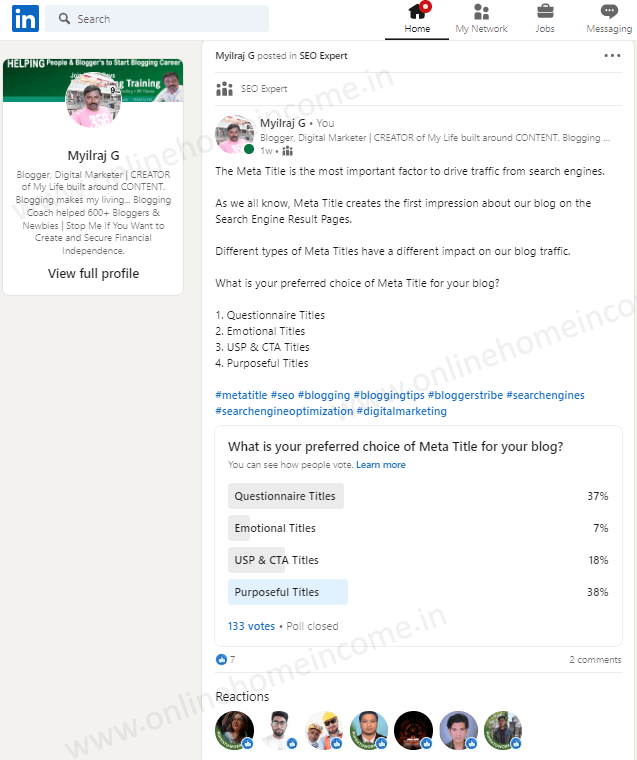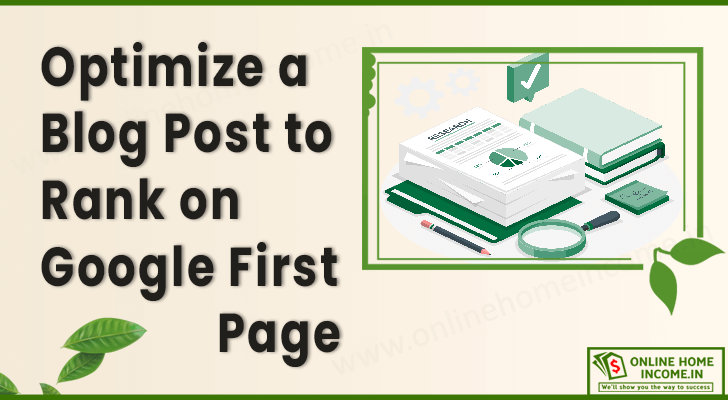The Meta Title is an HTML code that tells search engines and people what the web page is about? Let’s learn why Meta Title is important and tips to write the best title?
Today we will discuss some important topics on blogging. What is Meta Title, and Why Meta Title is Important?
Are you a blogger doing SEO? But could not be able to find a perfect way to scale up your blog ranking. No worries let me share some secret trick that helps your blog ranking.
When you go to the library to find out a specific book in the innumerable books, what is the first thing you will do? First, you will sort out a specific genre and then try to find out the exact book.
Genre-wise alignment of books eases the finding process. The Meta Title does the same help in your blogging process.
Meta Title is the key ranking factor. You could be a professional content writer or an amateur writing an SEO blog post, but learning how to write a good Blog Post Title is necessary.

⇒ Does $10 a day in your bank will make you happy? If so, here is an exciting opportunity for you to start free.
⇒ All you need is a Smartphone with an Internet connection. | Join today!
Search Engine Optimization (SEO) is the process of ranking a website or blog on the first page based on keywords.
Every blogger pays utmost attention when creating content but mostly fails to focus on writing an effective post title. The foremost thing to concentrate on when you write a blog post is the Meta Title.
So you have gained some basic information, right? Now, let us see how to write an effective Meta Title and improve the clicks from the search engines.
Learn the few tricks to craft the best title that triggers the audience’s interest.
1. What is a Meta Title?
In layman’s language, Meta Title is the link between a search engine and the people. It helps rank a blog by passing the article message in less than 55-60 character sentences.
Meta Title helps search engines to ease the process of understanding the entire article message. If you are a blogger, pay attention to the title tag, and the best SEO practices to increase organic traffic.
It is the first thing that catches the eyes of all visitors. An effective title should create curiosity and trigger the reader’s intent to click. It forms a strong foundation for any blog post.

Usually, you can see the Meta Title in two places. The first one is shown in Search Engine result snippets and the other one is in Browser’s tab.
It is added within the < head > … </ head > section of the HTML document, using the < title > … </ title > attribute. It is also named using different names such as “title tag”, “page title”, or simply “title”.
The Meta Title has a greater impact on page CTR (click-through ratio) and rankings. When people search on the Internet, they first read the title from the search results.
Then only they decide to click your link or not. So, you should understand the user’s perspective and craft a good title. It will get you more clicks from the Search Engines.
2. Why Do We Need to Optimize the Meta Title?
As Meta Title is the main attraction of the Search Engine Results Pages (SERPs), you have to bring out concise, accurate, and informative titles.
Though it does not act as a direct ranking factor used in search engine algorithms, it definitely enhances the rankings. The first impression is the best impression and the same holds good for Meta Titles as well.
If your blog wants to get a large volume of traffic, you should optimize the Meta Title in every blog post.
There are some standards (or conditions) to follow when writing a Post Title. Let us see what these are.
- The Meta Title should not be more than 55 to 60 characters in length.
- It should consist of your article’s primary keyword at least once.
- The primary keyword should be at the beginning as far as possible.
- A good title should only be used only once for the blog post.
If you are writing for a business website, you can include the company name, brand name, or the service (or product) name in the title.
When the title length goes beyond the character limit, the Search Engines truncate by appending with a (…) in the end.
It could negatively impact your contextual information if left out of the searcher’s view. We will discuss more why the Meta Title is important and how to write an effective title in the further section.

3. Different Types of Meta Title
So far, we have seen the importance and how to write a good title for your blog post. Now you should know, what are the different types of Meta Titles that can get you traffic.
You can pick any one of these types and put some attention to crafting a great title.
- Question-Based Title: People usually search on the Internet if they have a doubt (or) a question that seeks clarification.
- Example: What are the Best Business Courses in 2023? Career Ideas
- Direct Title (or Clarity Focused): The title clearly states the purpose of an article. Usually, it summarizes the entire information.
- Example: 14 Best Freelance Websites to Get Remote Jobs from Home
- How-To Title: The most successful form of Meta Title that gets you more clicks from the search engines. It usually starts with a how-to followed by an action the readers want to take.
- Example: How to Start an E-commerce Business? Clear List of Starting Procedures
- Reason Why Title: A slightly altered form of a how-to title in which it tells the audience why certain situations occur.
- Example: 10 Reasons Why You Should Start a Blog in 2024?
- Emotional Title: This type of title usually triggers people’s emotions, either positive or negative feelings. And it encourages them to read the article.
- USP Title: Mostly used in the eCommerce industry that tells the Unique Selling Point of the product or service. It could add value, quality, features, or almost anything that acts as a differentiator.
- Example: 8 Interesting Facts About Your Paycheck To Know in 2024
Many similar types of headlines are adopted across the blogging industry. Some of them are, “call-to-action titles”, “offer focused titles”, “solution-based titles”, “relational titles”, “location-based titles”, etc.
Next time, do not just write for the sake of having a meta title, but make it a value-added element of your blog post.
4. A Recent Study on the Types of Meta Titles
Recently I have conducted a survey on Linkedin about the type of Meta-Title. Most people have selected the Questionnaire and Purposeful titles.
The result is to focus on creating titles that trigger the reader’s emotions.
When people search on Google, your search snippet should grab attention. And to grab attention, your meta-title should be in such a way that triggers their emotion.
Attention-grabbing titles increase CTR from search engines. Hence more people will visit your blog. What’s more, your blog revenue will grow automatically as your blog page views increase.
The organic traffic is highly targeted, so the revenue is.
Now, you may know why a meta title is important, and let’s see five tips on writing an effective title.

5. Five Tips to Write an Effective Meta Title
Strategic titles can help you attract more readers and increase your organic reach. We have seen the different forms of titles and now let us discuss how to write an effective Meta Title.
It is incredibly significant in On-page SEO and is considered one of the most important ranking signals. From an SEO perspective, a good title should be there only once and follow the below conditions.
5.1. Include Your Primary Keyword
It is necessary to add the primary keyword (a.k.a focus keyword) in the title. Make sure the keyword is present as close to the beginning of the title.
You can also add synonyms, and secondary keywords to add more value. But do not overdo it, as we need to avoid keyword stuffing.
Try to include your brand name in the end. Your key priority should be to make sure your audience can easily understand the article’s context.
Add the keywords in a natural way that is descriptive and interesting. Always follow a thumb rule, write titles for humans and not for Search Engine bots.
Search Engine bots are clever enough to understand human language. Write a Meta Title that provides a birds-eye view of your webpage.
By reading just the Meta Title, the user must be able to understand your webpage. Thus, ensure that it is the gist of your webpage. You can achieve this by incorporating a content message.
5.2. Keep it Short and less than 60 Characters
Google and other search engines have a character limit of 55 – 60 characters. If your Meta Title is longer than that, Search Engines will cut off the remaining part appended with “…” at the end.
It often disturbs the flow of passing the entire information of the article to the readers. Moz research states that a post title under 60 characters expects about 90% visibility in search engines.
Follow a standard practice of writing titles with less than ten words for effective use.
Google has set a limit of 600px wide in most cases, and that is why we should keep our title length not more than 60 characters.
Follow the above method to cut short the title length but not the message.
5.3. Incorporate the Content Message
The biggest part of content marketing is creating valuable and informative content. By understanding the user’s perspective and helping them to find a solution, we need to craft titles in a similar way.
Make sure to incorporate the article context (or message) in the Meta Title. You have 3 – 4 seconds to convince your audience and let them click your link from the search snippet.
Keep your audience in mind when writing the title. It helps you to understand the audience’s intent. In this article, I am trying to explain, Why Meta Title is Important.
So the title is, Why Meta Title is Important and How Should You Write the Best Title? Now, it conveys the article message and makes users click the link in the search snippet.
Write a Meta Title in such a way that it provides a bird’s-eye view of your webpage. By reading just the Meta Title, the user must be able to understand your webpage.
Thus, ensure that it is the gist of your webpage. It can be achieved by incorporating a content message.
5.4. Add Engagement to the Title
People are reading our article in order to get a solution (or) to find an answer. Again, the Meta Title helps the readers to decide whether to click on your link in the search result pages.
So to get more clicks, add more engagement in the title that creates curiosity and triggers the user to click. No one likes the idea of reading a Meta Title that is just a few words.
Add more information like advantages, and provide facts, figures, and statistics. The Meta Title turns out to be more effective and captivating when you help users with tips and tricks.
It is one of the most natural ways of adding engagement to the title. In the above section, we have seen different title formats, and I believe that will be helpful for you.
You can add some benefits, power words, and emotional words in your title to make it more attractive.
Emotions often speak louder, and it is seen as an important engagement factor. Research shows that positive Meta Titles convey a stronger message that attracts more clicks.
5.5. Be Descriptive of What is on the Page.
Your title tag should be descriptive and interesting so that people tend to click on them. Try to describe your entire article message with a maximum of 10 words (or 55 – 60 characters).
You will hurt your search rankings when you fail at crafting titles that describe your page.
Create a unique title for every blog post, and do not try to trick the user into clicking through the link in the search results.
Google can easily find misleading Meta Titles and even penalize sites that do this. Create a descriptive headline that immediately takes the reader to the webpage.
The Meta Title must also double up as a window, giving users an insight into what they can find on the web page.
By all means, it must describe the content on the page. One main reason Why a Meta Title is important is that it is descriptive.
When you attempt to work on the Meta Title, make sure that it matches the content on the page.
Your illustrative title tag must trigger the reader to call to action. So that, you can easily compete with the other websites.
Conclusion
Writing a good title by knowing the importance of a Meta Title is one of the easiest things in SEO. It has a tremendous impact on your search results.
Spend enough time to work on your title tags which are the true backbone of your blog SEO. A good title itself increases the chance of getting more clicks from search engines.
If you spend five hours writing a 2000-word article, spend 30 to 45 minutes writing a title for the post.
I have given a piece of clear information that resonates with the search engine’s view of the title tags.
Google always doesn’t use your title and description tags. Sometimes they may come up with their own results if you fail to follow the standard practice.
By the end, you learned how to craft human-friendly Meta Titles. Writing content is not just enough, however, a good title plays a key role in content marketing.
Make use of the best tips and implement them in your article. If you have any questions about optimizing your title tags, reach me in the comments.







